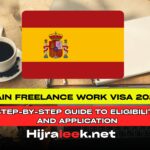The Germany Opportunity Card 2026, also known as the Chancenkarte, is a transformative residence permit designed to attract skilled professionals from non-EU countries to live and work in Germany without requiring a prior job offer. Introduced under the Skilled Immigration Act, this visa allows eligible individuals to reside in Germany for up to one year to seek qualified employment, particularly in sectors facing labor shortages, such as agriculture, healthcare, and IT. This comprehensive guide details the conditions, eligibility, application process, benefits, challenges, and FAQs for the Germany Opportunity Card in 2026, with a focus on applying online.
What is the Germany Opportunity Card 2026?
The Germany Opportunity Card (Chancenkarte) is a points-based residence permit that enables non-EU nationals to enter Germany for up to one year to search for a job. Unlike traditional work visas, it does not require a pre-existing employment contract, offering flexibility to explore opportunities in fields like agriculture, crafts, or technology. Holders can work part-time (up to 20 hours per week) or undertake two-week trial jobs to build connections with employers. If a job is secured, the card can be converted into a longer-term residence permit, such as an EU Blue Card.
For job opportunities, platforms like Hijraleek connect applicants with verified German employers in high-demand sectors.
Eligibility Conditions for the Opportunity Card 2026
To qualify for the Germany Opportunity Card 2026, applicants must meet specific criteria, either as a recognized skilled worker or through a points-based system. The key conditions are:
Basic Requirements
- Non-EU Citizenship: Open to third-country nationals from any country outside the EU/EEA or Switzerland.
- Educational Background: A recognized vocational qualification (minimum two years of training) or a university degree recognized in the country of origin. Recognition can be verified via the Anabin database or the Central Office for Foreign Education (ZAB).
- Language Proficiency: Minimum A1 German or B2 English per the Common European Framework of Reference for Languages (CEFR). Recognized tests include Goethe Certificate (German) or TOEFL/Cambridge Certificate (English).
- Financial Solvency: Proof of sufficient funds to cover living expenses, set at approximately €1,091 net per month for 2026 (subject to change). This can be demonstrated through:
- A blocked bank account (e.g., via Expatrio).
- A part-time job contract (up to 20 hours/week).
- A Declaration of Commitment (“Verpflichtungserklärung”) from a sponsor in Germany.
- Health Insurance: Valid health insurance covering Germany, such as Schengen travel insurance for the visa application, transitioning to German statutory or private insurance upon arrival.
Points-Based System
Applicants without a fully recognized qualification in Germany must score at least 6 points based on the following criteria:
- Partial Recognition of Qualification: 4 points if your foreign qualification is partially recognized by German authorities (e.g., via ZAB assessment).
- Shortage Occupation: 1 point if your qualification is in a high-demand field (e.g., agriculture, healthcare, IT). Check the List of Shortage Occupations.
- Professional Experience:
- 2 points for 2+ years of experience in the last 5 years.
- 3 points for 5+ years of experience in the last 7 years.
- Language Skills:
- German: 1 point (A2), 2 points (B1), 3 points (B2 or higher).
- English: 1 point (C1 or native speaker, in addition to German points).
- Age:
- 2 points if under 35 years.
- 1 point if 35–40 years.
- Previous Stay in Germany: 1 point for a legal stay of 6+ months in the last 5 years (e.g., study, work, excluding tourism).
- Partner Application: 1 point if your spouse/registered partner applies for the Opportunity Card simultaneously and meets the requirements.
Applicants with a fully recognized vocational or academic qualification in Germany (e.g., via German Chamber of Commerce Abroad or ZAB) are exempt from the points requirement but must meet the basic criteria.
For eligibility details, visit Make it in Germany or Germany-Visas.
Step-by-Step Guide to Apply Online
The Germany Opportunity Card 2026 can be applied for online via the Consular Services Portal or in-person at a German embassy/consulate. Citizens of Australia, Canada, Israel, Japan, New Zealand, South Korea, the UK, or the US can apply after entering Germany at the local Foreigners’ Authority (Ausländerbehörde). Below is the step-by-step process for online application:
- Check Points Eligibility:
- Use the online points calculator on the Consular Services Portal to confirm you score at least 6 points or hold a recognized qualification.
- Register an Account:
- Create an account on the Federal Foreign Office’s Consular Services Portal using an email and phone number for two-factor authentication (or two emails).
- Complete the Application Form:
- Fill out the electronic visa application form with personal details, contact information, passport details, travel plans, and financial proof.
- Upload Required Documents:
- Upload electronic copies (PDF, JPG, or PNG, max 10 MB per file) of:
- Valid passport (issued within the last 10 years, valid for 3+ months past entry, with two blank pages).
- Proof of residence (e.g., certificate of residence, identity document).
- Vocational or university degree certificate (recognized in the country of origin).
- Language certificate (A1 German or B2 English, e.g., Goethe, TOEFL).
- Proof of financial solvency (e.g., blocked bank account statement, part-time job contract, or Declaration of Commitment).
- Health insurance (Schengen travel insurance for the application, German insurance upon arrival).
- Criminal record certificate (apostilled and translated if needed).
- Proof of job search efforts (e.g., email correspondence, job applications).
- For partner applications: marriage or civil partnership certificate.
- If applicable: ZAB assessment or partial recognition notice for qualifications.
- All documents must be in English or German; otherwise, provide notarized translations.
- Upload electronic copies (PDF, JPG, or PNG, max 10 MB per file) of:
- Pay the Visa Fee:
- Pay €75 (subject to change) via credit card or PayPal during the online application process. Fees vary by country and are paid in local currency.
- Submit Application:
- Submit the application online. You’ll receive a confirmation PDF certifying the validity of your current residence title (if applicable).
- Attend Biometric Appointment:
- Visit the nearest German embassy/consulate or VFS Global center to provide biometric data (fingerprints, photo). An interview may be required to verify your application.
- Await Processing:
- Processing takes several weeks to six months, depending on the consulate’s workload. You’ll be notified once approved.
- Arrive and Register:
- Upon arrival in Germany, register your address at the Residents’ Registration Office (Bürgeramt) within two weeks (Anmeldung). Schedule an appointment at the Foreigners’ Authority to collect your residence permit if staying beyond 90 days.
For application support, visit VFS Global or Germany-Visas.
Germany Farm Work Visa 2026: Step-by-Step Guide
Benefits of the Germany Opportunity Card
- No Job Offer Required: Enter Germany to search for work without a pre-existing contract, unlike traditional work visas.
- Part-Time Work: Work up to 20 hours per week or undertake two-week trial jobs to build employer connections.
- Path to Permanent Residence: Secure a job to transition to a long-term residence permit, such as an EU Blue Card, with lower salary thresholds for shortage occupations.
- Cultural Immersion: Live in Germany’s vibrant cities or scenic regions, experiencing its culture and cuisine.
- Schengen Mobility: Travel within the 26 Schengen countries during off days.
- Skill Development: Gain experience in high-demand sectors, enhancing your career prospects.
Types of Jobs Accessible with the Opportunity Card
The Opportunity Card targets skilled professionals in fields with labor shortages, including:
- Agriculture: Farmhands, livestock caretakers, horticulturists. Salary: €1,500–€3,000/month.
- Healthcare: Nurses, medical assistants. Salary: €2,500–€4,000/month.
- IT: Software developers, IT specialists. Salary: €3,000–€5,000/month.
- Crafts: Electricians, carpenters. Salary: €2,000–€3,500/month.
- Logistics: Warehouse workers, drivers. Salary: €1,800–€3,000/month.
Find jobs via Hijraleek or Make it in Germany.
Key Dates and Availability for 2026
The Opportunity Card, implemented since June 2024, has no fixed annual quota, with availability based on demand and eligibility. Applications for 2026 should begin in late 2025 or early 2026, with processing times varying by consulate. Job searches are most effective during spring and autumn, aligning with hiring cycles in agriculture and other sectors.
Tips for a Successful Application
- Apply Early: Start in late 2025 to account for processing times and job competition.
- Use Trusted Platforms: Connect with employers via Hijraleek or job portals like Indeed and StepStone.
- Verify Qualifications: Check recognition status via Anabin or apply for ZAB assessment early.
- Prepare Documents: Ensure all documents are complete, apostilled, and translated into German or English.
- Learn Basic German: A1/A2 German skills improve job prospects and integration, even if not mandatory.
- Track Application: Monitor status via the Consular Services Portal and follow up with the consulate if needed.
Challenges and How to Overcome Them
- Points Threshold: Scoring 6+ points can be challenging without recognized qualifications or experience. Obtain a ZAB assessment or focus on shortage occupations to boost points.
- Financial Proof: Securing €1,091/month may be difficult. Open a blocked bank account or secure a part-time job offer before applying.
- Processing Delays: Visa processing can take up to six months. Apply 3–6 months in advance and ensure all documents are complete.
- Job Competition: High-demand sectors require proactive job searching. Use multiple platforms and network with employers.
- Language Barriers: Limited German skills may hinder integration. Use translation apps or take online German courses.
Germany Farm Work Visa 2026: Step-by-Step Guide
Frequently Asked Questions (FAQs)
1. What is the Germany Opportunity Card 2026?
The Chancenkarte is a one-year residence permit for non-EU nationals to seek qualified employment in Germany without a prior job offer.
2. Who is eligible for the Opportunity Card?
Non-EU nationals with a recognized vocational/university degree, A1 German or B2 English, and financial solvency (€1,091/month). Applicants need 6+ points or a fully recognized qualification.
3. How do I apply online for the Opportunity Card?
Register on the Consular Services Portal, complete the form, upload documents, pay the €75 fee, and attend a biometric appointment.
4. What documents are required?
Passport, degree certificate, language certificate, financial proof, health insurance, criminal record certificate, and job search evidence.
5. How long is the Opportunity Card valid?
It’s valid for 12 months, non-extendable unless you secure a job and transition to another residence permit.
6. Can I bring my family?
The Opportunity Card does not allow family reunification, but your spouse can apply independently for their own card.
7. How much can I earn with part-time work?
Part-time jobs (20 hours/week) pay €12.82–€20/hour (minimum wage €12.82/hour in 2026), depending on the sector.
8. When should I apply for 2026?
Start in late 2025 or early 2026, as processing takes weeks to months. Check Germany-Visas for updates.
9. Is German language proficiency required?
Minimum A1 German or B2 English is required. Higher German skills earn additional points.
10. What if my application is rejected?
Review the rejection reason, correct issues (e.g., missing documents), and reapply with updated materials.
Conclusion
The Germany Opportunity Card 2026 is a game-changer for non-EU professionals seeking to work in Germany’s dynamic job market without a prior job offer. By meeting eligibility criteria, leveraging the points system, and applying online through the Consular Services Portal, you can access opportunities in agriculture, healthcare, and more. Platforms like Hijraleek and resources like Make it in Germany and VFS Global provide essential support. Start your journey today to explore Germany’s vibrant economy and culture.




















